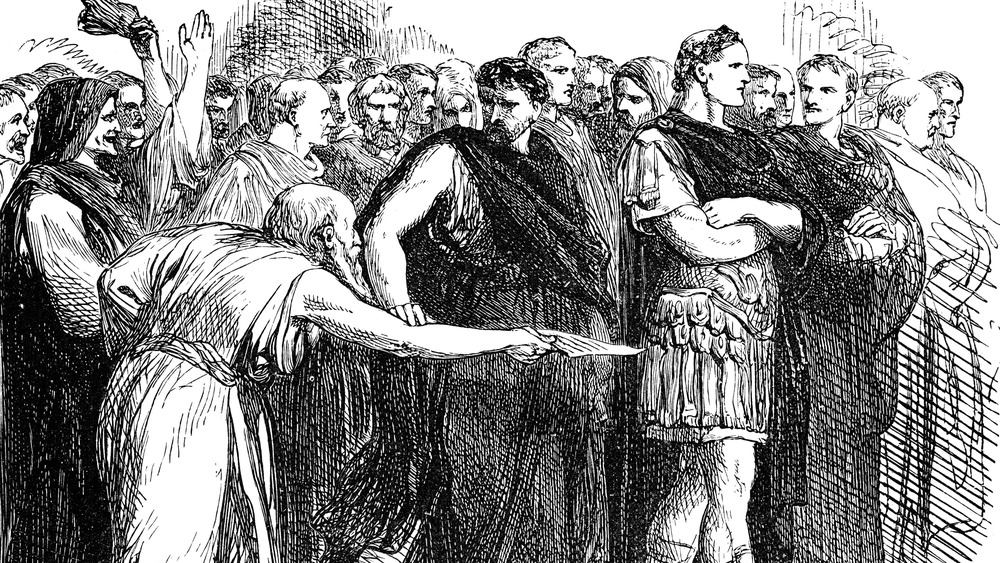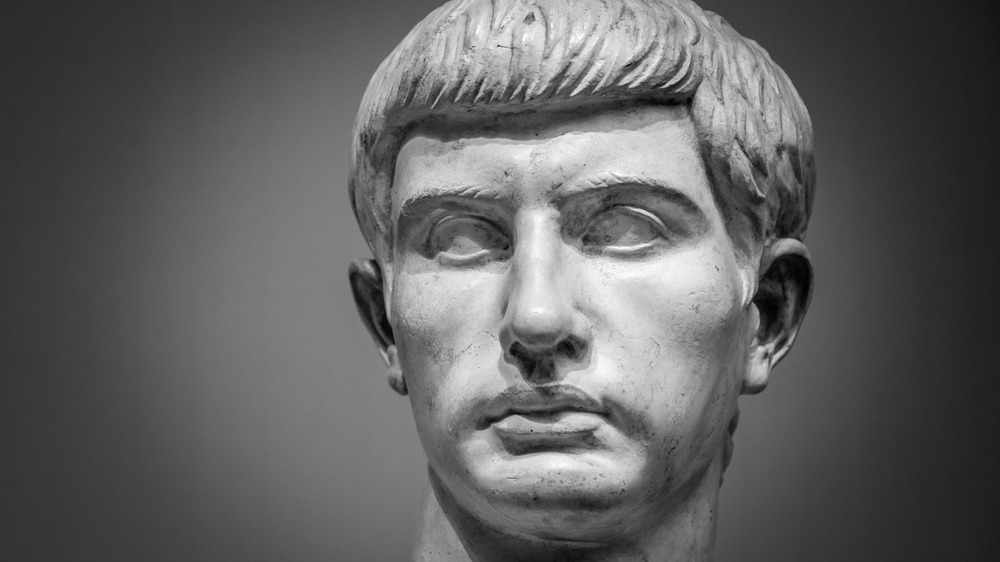What Happened To Julius Caesar's Assassins?
March 15 is forever known as the Ides of March, the day when Julius Caesar was literally stabbed in the back by his comrades. In their view, the assassins were doing Rome a favor, though many historians these days believe the killing of Caesar began the decline of the Roman republic. While the assassins and their co-conspirators planned meticulously how to murder Caesar, they didn't plan for his death's aftermath. And in the end, the killers found they couldn't live in the future they helped create.
When Julius Caesar announced himself dictator perpetua, or lifelong dictator, both his enemies and allies were concerned. According to History, there were around 60 conspirators against Julius Caesar, but it was led by Marcus Junius Brutus, Gaius Trebonius, Decimus Junius Brutus Albinus, and Gaius Cassius Longinus. Brutus was close to Caesar, the son of Caesar's mistress Servilia. People even believed Brutus was his son. Brutus thought there would be enough support for them.
All the conspirators decided the best way to kill Caesar is during a Senate session using double-edged daggers — easy to hide under robes. History Extra noted Caesar did not plan to attend the March 15 session. His wife, Calpurnia, believed something terrible was about to happen and told him not to leave. But Decimus, whom Caesar trusted, convinced Caesar to go with him, to where the 60 assassins were waiting.
The bloody meeting
Once Caesar entered the chamber, the assassins descended upon him. First to strike was Tillius Cimber, who pulled at Caesar's robe as a signal to the killers. Chaos descended. Caesar fought to run from his murderers, but was overwhelmed. Other senators not involved in the plot sprinted away. Finally, the former dictator succumbed to his many wounds.
Unfortunately, none of the 60 assassins had any idea what to do after killing Caesar. The Ancient History Encyclopedia wrote Brutus spoke from a platform to calm the situation, and believed the death of Caesar would bring about the old Roman spirit. They failed to take into account the public's love for Caesar. As his body was paraded, people wept. Caesar's trusted lieutenant Marc Antony brokered a deal with the Senate to keep all of Caesar's laws, but provide amnesty for the killers. They would not be arrested, but any changes to positions or laws they wanted would not be granted.
The public hated the idea. Many of the conspirators were practically run out of Rome. Brutus left for Crete, while Decimus stayed with the army. Cassius held power in Asia, so he bided his time there. Many thought they were safe but, with the ascendance of Caesar's chosen successor, Octavian, things quickly went south. Octavian wanted to be emperor, and he did agree that the assassins were given leniency. One of Octavian's first actions was to declare the assassins enemies of Rome, and the republic descended into Civil War.
In the end, they failed
Brutus and Cassius were involved in planning the Civil War and fought against both Octavian and Marc Antony. Both sought to use Marc Antony and Octavian's growing rift to their advantage, but couldn't manage it.
In the end, many of the conspirators were killed In the civil war. Brutus and Cassius both committed suicide after defeats against Octavian and Marc Antony. Trebonius was captured and beheaded. Decimus attempted to join Brutus and Cassius, but was himself assassinated en route. The last remaining conspirator, Cassius Parmanesis, lived in Athens writing poetry, per Smithsonian Magazine. But by the summer of 30 BCE, an Octavian loyalist tracked him down and murdered him.
The assassins sought to remove one dictator, but they inadvertently encouraged someone much worse. Politico reported Caesar didn't consider himself a king; he was just merely consolidating power for his loyalists. Octavian, however, was different. After defeating Marc Antony in yet another civil war, he declared himself emperor and thus began the Roman empire. That empire eventually fell, but it would be centuries before that happened. Julius Caesar's assassins succeeded in killing him, but failed to restore themselves to power. Ultimately, they sealed their fates.


